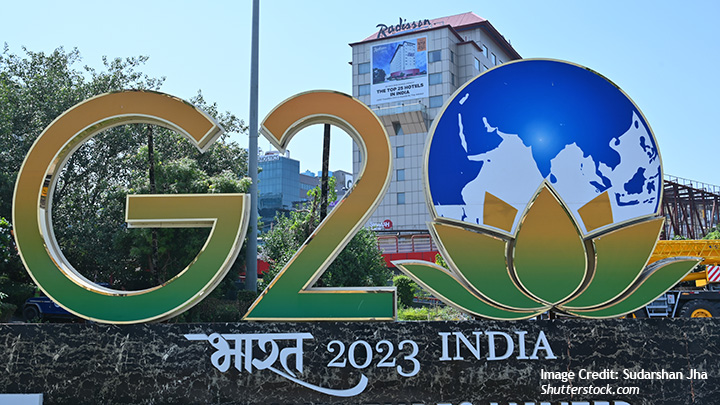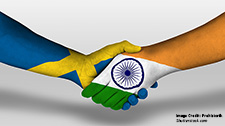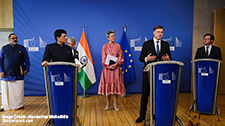Between BRICS & G20: India & Global South Are a Resolute Match!

Jagannath P. Panda
Even before India took over the presidency of the Group of Twenty – the influential forum of major global economies, popularly called the G-20 – India did not shy away from acknowledging the stint as both a responsibility and an opportunity to focus on reforming global governance and creating equitable growth. It was also quite clear that the Global South narrative would be linked to India’s national growth aspirations.
It was also categorically designed to be a spectacle not limited to the specialized policy experts but extended to the masses, especially nationally. The almost year-long events (about 200) in more than 50 cities across India have ensured that India’s public outreach toward making G20 accessible has been successful.
Besides, India has also succeeded in initiating projects (from working groups to conferences) on topical themes including Startup 20; disaster risk reduction; climate-resilient and nutritious grains (with a focus on millets, the “superfood” ignorantly disregarded by European countries); green, responsible consumption; women-led development; sustainable growth; and technological transformation. A host of initiatives, from a center of excellence to a young diplomats’ forum, for the Global South were a particular highlight.
Importantly, the release of a joint Delhi Declaration – in line with India’s stand on the Ukraine war, leaning heavily on the anti-war language without criticizing Russia – amid a seemingly irreparable divisive scenario featuring the Russia-China combine versus the West and the inclusion of the African Union (AU) as a G20 permanent member are incredible achievements for India’s diplomacy.
Other important Global South-related announcements include the establishment of a Green Hydrogen Innovation Centre, upping climate finance (from billions to trillions); enhancing digital inclusion; addressing debt vulnerabilities (e.g., acknowledging Ghana’s and Sri Lanka’s crises); and “reinvigorating” multilateralism.
The launch of a rail and shipping corridor linking South Asia, West Asia, and Europe – including India, Saudi Arabia, the United Arab Emirates, Jordan, Israel, and the European Union – is expected to boost trade, energy, and digital connectivity. China’s absence indicates that this project would offer a counter to the Belt and Road Initiative (BRI).
Indian Prime Minister Narendra Modi in his closing remarks also proposed a virtual session of the G20 at the end of November to review the progress made thus far.
Unarguably, as one of the world’s largest emerging economies and a prominent member of the Global South, India has played a pivotal role in shaping the narrative of the Global South within the G-20. Starting with the “Voice of Global South Summit” in January where more than 100 countries participated, New Delhi has used its watershed moment as G-20 president to strategically advance the interests and concerns of developing nations. The emphasis on increasing the representation of Africa (India’s widely accepted proposal to include the AU in G20 permanently and invites to two African states as summit observers) is noteworthy, not just because of its intrinsic relevance but also to counter China’s growing clout in the continent.
India has, most importantly, emphasized the importance of a development-, human-centric agenda by advocating for policies that prioritize economic growth and poverty reduction in developing countries. As “voice of the global south” India has reiterated that global economic stability should be accompanied by equitable distribution of benefits, emphasizing social justice.
In particular, sustainable development has been a cornerstone of India’s stance. A vocal proponent of integrating environmental considerations and social equity into G-20 discussions, India has sought to promote the concept of a just transition to cleaner energy sources, highlighting the significance of climate finance for developing nations to combat climate change. The UN Assistant Secretary-General Ligia Noronha, too, has hailed the just transition efforts as “being finally given the attention they deserve.”
Furthermore, as part of its dedication to representing interests of the Global South, Delhi has championed values like inclusivity and a more balanced economic order, by calling for fair trade and investment practices, addressing trade barriers and protectionism that hinder the economic progress of Global South nations, better financial inclusion, healthcare, education, and bridging the digital divide. Rather than viewing its presidency as an image-building exercise, India has sought to use its leadership to pave the way for a new, more inclusive, and open global order.
India’s cooperative, consultations-based efforts to garner the support of the Global South is in contrast to China’s financial influence-based corrosive approach, exemplified by the debt trap-inducing BRI. Moreover, in the recent past, China’s anti-West agenda has begun alienating the majority in the Global South, which is not keen to enter into divisive geopolitical schemes amid a debilitating economic insecurity and climate change landscape.
This was in evidence during the recently concluded BRICS Summit in Johannesburg. The economic grouping originally comprising Brazil, Russia, India, China and South Africa via its six new entrants underscored the centrality of energy producers and expanding trade using local currencies.
Notwithstanding India’s concerns against newer entrants inflating China’s clout in non-Western forums, the consensus-backed expansion of the BRICS has strengthened India’s Global South proposition that primarily centers around values like inclusivity and diverse representation. Not only can it help boost the agenda of developing nations but also help India showcase its own leadership as the voice of the Global South in the coming years.
The expansion has thus given new momentum to the importance of South-South cooperation – the interest from 40 countries to join is indicative of the bloc’s reach and potential that should not be negated by those who see the forum as a “motley crew of failing states.” At the same time, it also highlighted that China and Russia’s common ideal of realizing a “post-Western” world order will not find much resonance in the Global South.
However, it would be facile to suggest that China is not making headway in the Global South. Be it through the China-brokered Saudi-Iran deal in March or China-Brazil “greater cooperation” after President Luiz Inácio Lula da Silva’s visit in April or China’s expanding efforts in Eurasia where Russia’s traditional influence is under scanner, China has certainly established itself as a leading partner for the Global South – something that is unlikely to change soon.
For India, both the BRICS summit and the G-20 presidency outcomes have become markers of its economic and technological growth; the Global South leadership has been the icing in its cake. India is certainly in a position to act as a gluing agent between the West and the East while championing the concerns of the Global South. Even the state-owned Chinese media has grudgingly accepted that India’s G20 Presidency is gaining worldwide attention, which could “turn this influence into a driving force for growth.”
India’s status as one of the fastest-growing economies with a burgeoning young, talented workforce growth; as the first country to soft-land a spacecraft on the moon’s south pole; and its centrality in the emerging Indo-Pacific security architecture (e.g., the Quadrilateral Security Dialogue) has only cemented its global profile.
Especially in the wake of Russia’s invasion of Ukraine, India’s national interest-focused multi-aligned stand that did not castigate Russia and successfully waded through the West’s criticism by relentless strategic maneuvers exemplified by Prime Minister Narendra Modi’s personal diplomacy, including phone calls with Putin, has highlighted an optimistic global multilateral trajectory.
Therefore, despite China’s President Xi Jinping skipping the meeting – Premier Li Qiang attended the summit – and Russia’s Vladimir Putin deciding to send Foreign Minister Sergei Lavrov in his stead, the issuing of the Declaration highlights that India’s G20 agenda would be carried forward by the future presidencies (Brazil, South Africa, and the US). A joint statement by the leaders of India, Brazil, South Africa, and the United States at the sidelines of the G20 summit in 2023 reaffirms this commitment to address global challenges.
Moreover, even as conflicting ideas and ideologies makes consensus-building difficult, the route to reformed and effective multilateral platforms is by continuing to labor on and emphasize on cooperative mechanisms, even when they appear idealistic. Only then can states not only engender global solidarity but also bring the marginalized societies to the forefront of the new-era multipolarity.
This piece was first published at Korea On Point on September 11, 2023.
Related Publications
-
Decoding Japan’s Political Trajectory in 2024
As 2024 opens, Japan’s politics, particularly the fortunes of the ruling Liberal Democratic Party (LDP) led by Prime Minister Fumio Kishida, is witnessing an accelerated downward spiral. A week after […]
-
Abandoning Neutrality, Absorbing Multipolarity: India and Sweden by 2047
Pragmatism and polarised positioning have become the new normal in foreign policy decision making – and Sweden and India are no exception. Sweden moved away from and perhaps permanently abandoned […]
-
EU-Thailand FTA Negotiations: IUU Fishing and Human Rights Remain Obstacles
Thailand’s fishing industry, which at its height saw as many as 200,000 migrant workers from neighboring Laos, Myanmar, and Cambodia caught in a brutal system of abuse, withered global criticism […]
-
Trade, Connectivity and Supply Chains in EU-India Relations
In the decade and a half since 2007 when the EU and India first started their FTA negotiations, the world economic order has undergone a sea change. During that period, […]
-
India-Sweden Strategic Compass, Vol.3, No.1, January-February 2024
How are India and Sweden positioning themselves in the year 2024? The year 2024 is historic in terms of elections being held throughout the world. About half of the world’s […]



